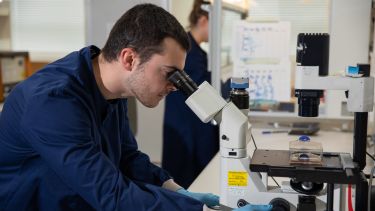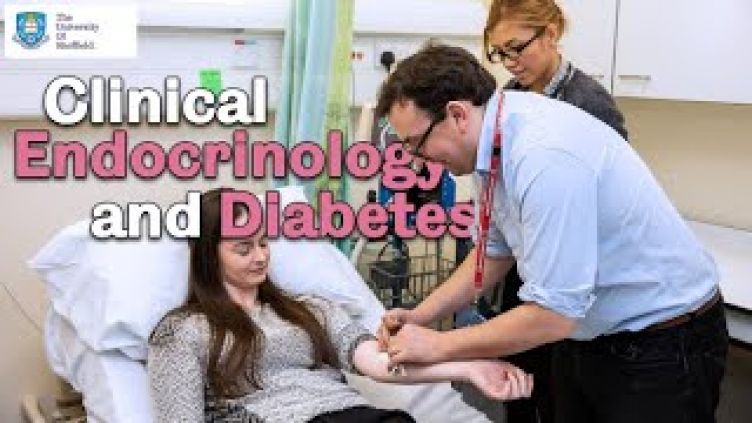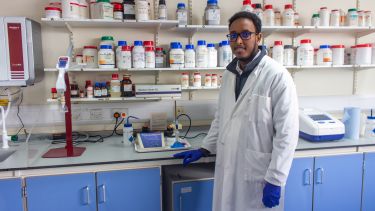Explore this course:
Applications for 2024 entry are now open. Apply now or register your interest to hear about postgraduate study and events at the University of Sheffield.
Clinical Endocrinology and Diabetes
School of Medicine and Population Health,
Faculty of Health

Course description
This course focuses on the role of hormones in regulating all key bodily processes. It covers fundamental endocrinology, how this underpins disease processes throughout all stages of life, and how this knowledge can be used to develop treatments.
You will study topics including hormone synthesis, homeostasis and the pathophysiology of endocrine disorders that affect children, young people and adults. Alongside other subjects in endocrinology, diabetes is examined in detail – from its symptoms and complications to effective management strategies – so you can learn how it affects patients throughout their lives. You will also explore the process of testing and developing potential new drugs to treat endocrine disease.
The programme is led by experienced clinicians and scientists specialising in endocrinology and diabetes. You will have the opportunity to join them in clinics and clinical meetings at Sheffield Children’s Hospital and Sheffield Teaching Hospitals. A significant part of the degree will be your six-month research project, where you will join one of our research teams to develop your skills in the lab and run your own experiments to test a hypothesis in endocrinology.

Modules
The first half of the programme consists of six taught modules that run from September to March.
The second half of the programme from March to September encompasses the research project module. Completion of all seven modules is required for the MSc.
- Principles of Endocrinology
-
The module is designed to provide an introduction to the fundamental principles of endocrinology and diabetes . This will include an account of cellular signalling pathways and receptor classes. This will then introduce gene regulation, differentiation, and the importance of hormones in development and homeostasis. The role of hormones in both pediatric and adult life will be introduced. The module will also provide the basics on defects in hormonal function, both genetic and autoimmune, that are relevant to the understanding of pathophysiology and endocrine disease. Clinical chemistry and the assessment of hormone function will also be covered.
15 credits - Paediatric and Adolescent Endocrinology
-
This module has been designed to give the student a broad overview of the disease entities seen within paediatric endocrinology and an understanding of their underlying pathophysiology. The student will be introduced to the current clinical approaches used to investigate and manage the core conditions seen within paediatric endocrinology. Students will be taught through lectures delivered mainly by clinicians. They will consolidate and contextualise their learning by participating in tutorials in which clinical data will be discussed and they will also have the opportunity to observe in paediatric endocrinology clinics.
15 credits - Endocrine Disorders in Adults
-
This module is designed to provide students with a comprehensive knowledge of pivotal biochemistry, pathophysiology and pathology relevant to endocrine disorders in adults. This will be achieved by a blend of lectures, seminars and practical sessions. The emphasis will be placed on the commoner clinical problems and their solutions. Various clinical sequelae due to endocrine disorders will be introduced and a broad range of clinical and underpinning scientific scenarios will be covered.
15 credits - Diabetes over the life course
-
This diabetes module will highlight the main aspects of diabetes in its various forms across the lifespan. Lectures will be delivered by clinicians to teach the pathophysiology of the main conditions and complications of diabetes, as well as explaining current management strategies. The vital role of the multidisciplinary team and self-management of the condition will be illustrated. The impact of diabetes will also be explored in a wider societal context. Students will be encouraged to observe in clinics to help contextualise their learning. Tutorials will focus on clinical data and case histories.
15 credits - Research Skills, Innovation & Technology
-
The module has been designed to give the student an understanding of endocrine disease and how progression in the field of pharmaceutical medicine and translational research has been used to develop effective treatments.
30 credits
It will introduce the student to the genetics and treatment of endocrine disease and how both in vitro and in vivo models systems have been used to (1) further our understanding of disease complexity and (2) test potential new drugs. The subject of drug development in the context of translational research will be discussed.
A series of tutorials and lectures will help link specific aspects of the course, together with practical aspects of drug research and development - Research project (MSc Clinical Endocrinology and Diabetes)
-
The research project module will provide the opportunity to learn and apply research methods to test a specific scientific hypothesis. It will also enable the development of good laboratory skills in the appropriate methods and proper recording and analysis of experimental results. Health and safety in the laboratory and the ethical aspects of research will also be covered.
90 credits
A list of projects will be made available and students will be asked to select their top choices. Once assigned a project of their choice, students will carry out a 25-week research project. Students will present a poster of their findings during the module. Upon completion of their research project, students will submit a structured dissertation describing their research. This will be supplemented with an oral exam.
During the project, students will be expected to attend departmental seminars to widen their scientific knowledge, laboratory group meetings to present their current work, and regular supervisor meetings to discuss progress and plan experiments.
The research project module will provide the opportunity to learn and apply research methods to test a specific scientific hypothesis. It will also enable the development of good laboratory skills in the appropriate methods and proper recording and analysis of experimental results. Health and safety in the laboratory and the ethical aspects of research will also be covered.
A list of projects will be made available and students will be asked to select their top choices. Once assigned a project of their choice, students will carry out a 25-week research project. Students will present a poster of their findings during the module. Upon completion of their research project, students will submit a structured dissertation describing their research. This will be supplemented with an oral exam.
During the project, students will be expected to attend departmental seminars to widen their scientific knowledge, laboratory group meetings to present their current work, and regular supervisor meetings to discuss progress and plan experiments.
The content of our courses is reviewed annually to make sure it's up-to-date and relevant. Individual modules are occasionally updated or withdrawn. This is in response to discoveries through our world-leading research; funding changes; professional accreditation requirements; student or employer feedback; outcomes of reviews; and variations in staff or student numbers. In the event of any change we'll consult and inform students in good time and take reasonable steps to minimise disruption.
Open days
An open day gives you the best opportunity to hear first-hand from our current students and staff about our courses.
Find out what makes us special at our next online open day on Wednesday 17 April 2024.
You may also be able to pre-book a department visit as part of a campus tour.Open days and campus tours
Duration
1 year, full time
Teaching
You will learn through lectures, seminars, tutorials, practical classes, independent study and your research project.
Assessment
You will be assessed through practical exercises with reflective reports, preparing abstracts and grant proposals, presentations on clinical cases and studies, and journal club-style presentations. The research project is assessed through a poster presentation, short reflective reports, a thesis and a short oral exam based on your written work.
Your career
This course will give you specialist knowledge and skills for roles in clinical laboratories, the pharmaceutical or biotechnology industry, medical policy, healthcare communications or education. The course is also great preparation for a PhD and a career in endocrinology or diabetes research.
For medical students, the course provides a clinical introduction and foundation if you are interested in sub-specialising in endocrinology and diabetes.
Entry requirements
You'll need at least a 2:1 in a relevant life science undergraduate degree (eg Biochemistry, Biology, Genetics, Molecular Biology or a degree in veterinary science or medicine). A 2:2 degree may be acceptable depending on an interview and assessment of your past achievements.
Medical students can intercalate after completing three years of their medical degree.
Overall IELTS score of 7.0 with a minimum of 6.5 in each component, or equivalent.
If you have any questions about entry requirements, please contact the department.
Fees and funding
Apply
You can apply now using our Postgraduate Online Application Form. It's a quick and easy process.
Contact
Any supervisors and research areas listed are indicative and may change before the start of the course.
Recognition of professional qualifications: from 1 January 2021, in order to have any UK professional qualifications recognised for work in an EU country across a number of regulated and other professions you need to apply to the host country for recognition. Read information from the UK government and the EU Regulated Professions Database.

